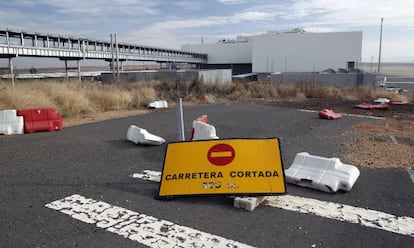Chinese group buys Ciudad Real ‘ghost’ airport for €10,000
Deal includes runway, control tower and hangars, but not terminal or parking areas Tzaneen International plans to spend up to €100m on upgrading the site


A group of Chinese investors has bought the abandoned airport at Ciudad Real for €10,000 after submitting the only bid for the facility at a court bankruptcy auction.
On Friday, Tzaneen International was awarded the land and buildings, including the runway, hangars and control tower at Ciudad Real Central Airport in Castilla-La Mancha – the first major airport to be built in Spain with private investment.
Little is known about the investment group except that it was organized to take part in the court auction
However, the Chinese group will not control the terminal or the parking areas, according to the terms of the tender.
Little is known about the group except that it is an “investment vehicle” registered some months ago in Spain with the sole purpose of taking part in the court-sponsored auction.
According to papers filed with the Mercantile Register, the group listed €4,000 in capital from China but stated that members of the consortium include both Chinese and European investors. It also explained that “various Chinese companies” are interested in using the airport as “a gateway to Europe” for their importing businesses.
Tzaneen International was the only bidder that came up with the €2 million bond required by the court to take part in the auction.
The Ciudad Real facility, also known as Don Quijote Airport, opened with much fanfare in 2008 as the first installation of its kind in Spain built with private capital, at a cost of €450 million. But passenger demand was low and it was finally shut down in 2012.

Like the similarly troubled Castellón airport, the complex became a symbol of the wasteful spending that took place during Spain’s construction boom, which came to an abrupt end with the start of the economic crisis in 2008.
In February 2014, the owners tried to put it on the market for €100 million, but soon dropped the price to €80 million before the court stepped in to call an auction.
In court papers filed on Friday, the Chinese group explained that it submitted a low bid because it would need to reapply for aviation licenses and spend between €60 million and €100 million to upgrade the facilities.
The court had appraised the airport at €40 million but set a minimum offer of 70 percent of this amount – €28 million – for prospective buyers. It also issued a 20-day grace period for other possible bidders to come up with the €28 million.
Because August is not included in the period, the deadline for new bids is September 14. But even if other offers come in during this time, the Chinese group will most likely keep the airport by matching or submitting a higher bid, EFE news agency reported.
The firm Griffin-Pegasus Airports, which has expressed an interest in purchasing the facility, has said it will challenge the auction on technicalities.
Other people and businesses who also expressed an early interest in the airport include the Málaga entrepreneur Francisco José Ortiz, who tried to buy it three times; several Madrid-based firms, and the Chinese group HNA Group Co., which recently purchased a majority share in NH Hoteles.
Tu suscripción se está usando en otro dispositivo
¿Quieres añadir otro usuario a tu suscripción?
Si continúas leyendo en este dispositivo, no se podrá leer en el otro.
FlechaTu suscripción se está usando en otro dispositivo y solo puedes acceder a EL PAÍS desde un dispositivo a la vez.
Si quieres compartir tu cuenta, cambia tu suscripción a la modalidad Premium, así podrás añadir otro usuario. Cada uno accederá con su propia cuenta de email, lo que os permitirá personalizar vuestra experiencia en EL PAÍS.
¿Tienes una suscripción de empresa? Accede aquí para contratar más cuentas.
En el caso de no saber quién está usando tu cuenta, te recomendamos cambiar tu contraseña aquí.
Si decides continuar compartiendo tu cuenta, este mensaje se mostrará en tu dispositivo y en el de la otra persona que está usando tu cuenta de forma indefinida, afectando a tu experiencia de lectura. Puedes consultar aquí los términos y condiciones de la suscripción digital.








































